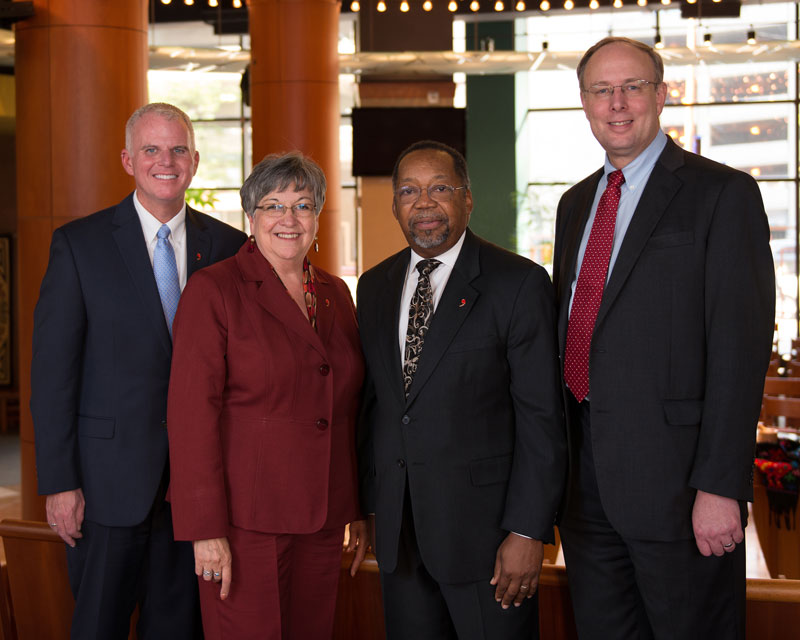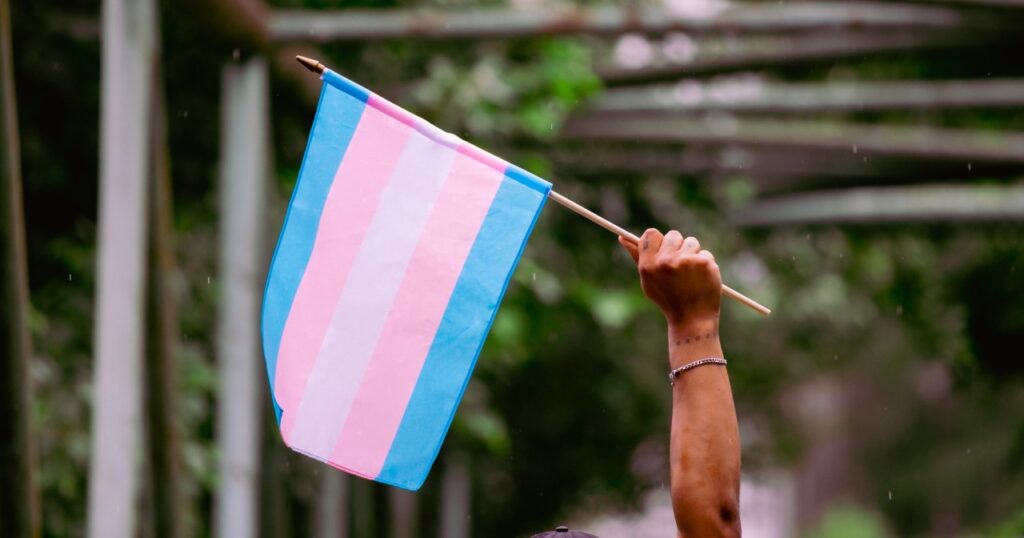A Pastoral Letter on Racism: A New Awakening
 As America honors the legacy of the Rev. Martin Luther King, Jr. and the ideals of equality, service and beloved community that he lived and died for, the Cleveland-based United Church of Christ has released a Pastoral Letter on Racism, with the hope and expectation that it will be read in our 5,100 churches nationwide on Martin Luther King Jr. weekend or to conclude the Week of Prayer for Christian Unity on Sunday, Jan. 25.
As America honors the legacy of the Rev. Martin Luther King, Jr. and the ideals of equality, service and beloved community that he lived and died for, the Cleveland-based United Church of Christ has released a Pastoral Letter on Racism, with the hope and expectation that it will be read in our 5,100 churches nationwide on Martin Luther King Jr. weekend or to conclude the Week of Prayer for Christian Unity on Sunday, Jan. 25.
With the recent rash of deaths of African Americans at hands of police, the UCC national leaders hope Martin Luther King weekend will be an opportunity for us to both address those issues through our continuing advocacy and hope for change toward King’s beloved community.
Here is the text of that letter:
Dear Sisters and Brothers in the United Church of Christ,
As the liturgical season turns to Epiphany and our national calendar turns to Martin Luther King Jr. Day, we are aware of our profound need for a new awakening of understanding about race and racism in our midst. As a church of Jesus Christ, we pray that the Holy Spirit will illuminate our hearts and minds and stir us into faithful response to the ongoing manifestation of racism which is evident in tragic and painful ways in our communities.
Born in the midst of the Civil Rights Movement and having deep roots in the 19th century struggle to abolish slavery, the United Church of Christ has a lasting engagement in the struggle for racial justice. The 1991 Pastoral Letter on Contemporary Racism emphasized the Seventeenth General Synod declaration that “[r]acism is a sin and an evil that stands as an affront to the Christian faith.” The 2008 Pastoral Letter that accompanies Sacred Conversations on Race pointed out, “Racism remains a wound at the heart of our nation that cannot be wished away or treated carelessly.” These writings from our leaders during those years remind us that acknowledging and challenging racism is not new for the United Church of Christ. They also remind us that we are theologically and spiritually compelled to seek the elimination of racism within ourselves, in the church and in society.
The extrajudicial killing of black and brown men and women by police officers is in and of itself reason to cry out against injustice. But the targeted shooting of police officers is also reason to mourn and lament the use of violence. We cannot conflate and equate one kind of tragedy with another or simplify complex realities that cannot be “fixed” overnight. We should not be creating more strife by participating in attempts to make this an “us against them” conflict, nor should we allow ourselves to look away from the harsh realities of this historic moment pretending that racism is not at the core of the injustice.
The roots of the issues go far deeper than we would want to admit. Therefore, it is important to revisit American history in an effort to understand our current reality in an appropriate context. Our history is that of enslavement of people of African descent and the annihilation of the native peoples of the land. It includes decades of state-sanctioned segregation and lynching. These are among the realities that shape our present. Although slavery, genocide against Native Americans, mob-initiated lynching, and segregation have ended, we cannot ignore their lasting impact on present attitudes and behaviors regarding race. Nor can we ignore the disproportionately high rates of incarceration of men and women of color.
Epiphany reminds us that a new understanding is possible because God has come to us in human form and dwells among us. Like the Magi who travelled from a distance, we, too, need to find our way to understanding. Our paths might need to be on roads less travelled so that we are able to arrive at a truly new place when it comes to gaining insight into the depth of systemic racism. Getting to that new place of understanding will take time, courage and continued commitment on the part of all. Then and only then can true healing and reconciliation happen.
Let us not rush to the language of healing,
before understanding the fullness of the injury and the depth of the wound…
let us not speak of reconciliation without speaking of…how we can repair the breach and how we can restore the loss…
These words are from a litany prepared by Dr. Yolanda Pierce in response to recent events in Ferguson, Missouri, and elsewhere. As people of faith, following that Star to Bethlehem, we are called to lament and abide in humility with those who mourn, rage, and pour out their pain and grief from all communities.
We lament and abide with the communities of Aiyana Jones in Detroit, Michigan; Eric Garner in Staten Island, New York; Yvette Smith in Bastrop, Texas; Michael Brown in Ferguson, Missouri; Kathryn Johnson in Atlanta, Georgia; Tamir Rice in Cleveland, Ohio—those who died at the hands of police. We lament and abide with the communities of slain police officers Rafael Ramos and Wenjian Liu in New York. We lament the reality that Black and Latino police officers on their off-duty time are susceptible to the same over-policing and discrimination that communities of color suffer. We seek healing, too, but recognize that wounds not fully cleansed will not heal properly.
Efforts to hold individual police officers and police departments accountable must not be misconstrued to be anti-police. Law enforcement officers have every right to expect respect from community members when they are performing their jobs with integrity and accountability. However, communities, and especially communities that have a long experience of racial injustice at the hands of police and within the justice system, have every right to expect government to hold law enforcement and public safety departments accountable for their actions when individual officers abuse the power entrusted to them and when there is clear evidence of racial bias and profiling.
Accountability and responsibility do not simply rest with the police. As members of the Christian faith, as residents in our communities, as law enforcement officers or family members of law enforcement officers, as elected officials, as clergy and lay leaders, as mothers and fathers of those who might be at risk, and as individuals seeking to be guided by the Good News that all of us are created in God’s holy image, we, too, must confess that we fall short of who we are called to be as followers of Christ. We also confess as a denomination that is majority white in membership that we have not lived into our commitments to be an anti-racist church and an intercultural, multiracial church to the extent that God has called us to be. On matters of race and racism we have lapsed into complacency in part because racism seems intractable. It won’t go away. Or because we want to believe that we are living in a “post-racial era.” If we are able to embrace this confession as our own, our calling as Jesus’ disciples then inspires and even compels us to be accountable and responsible in pursuit of the end of racism, however long it takes.
It is important to understand that the racism we face today, while daunting and seemingly intractable, is not the racism Americans of all races faced decades ago. Today, we are more keenly aware that racism is more than an individual sin and it involves more than a private injury. Our understanding of racism as more than a black/white issue has deepened and now we are able to see that racism is also institutional and systemic. We have been re-awakened to the disturbing differences in perception among us about how law enforcement functions in our various communities. Thus the need for white Americans to continue work on understanding how institutional and systemic racism benefits them has been heightened.
The role of younger Americans from all our diverse communities in leading protests in cities throughout the country and developing new initiatives for creating justice within our communities is a powerful testimony to the legacy of the Civil Rights Movement, while at the same time offering constructive challenges to those who led the movement in the 1960s. We are proud of the clergy and lay leaders within the United Church of Christ who are actively engaged today in these efforts to establish “justice within the gates” of their communities. It is important that we understand them and the protest they lead as a living continuum of a historic effort to transform American society from being a racially stratified and divided society to a community firmly grounded in racial equality. Indeed, these young Americans are a sign of hope.
Eradicating racism will happen only as we take action to produce conditions that will allow for the fullness of life for those who have suffered its destructive impact, as we work to reorient institutions that perpetuate racist practices, and as we dismantle systems that coalesce to produce racial injustice. We believe that the United Church in all of its settings can and must engage this kind of action as an act of faith and faithfulness to God. To that end we invite you as sisters and brothers in Christ to prayerfully consider these actions and others that emerge out of your particular thought and context:
- Engage in initiating local church partnerships that bring churches of different racial, ethnic, class, linguistic and cultural backgrounds together to engage in relationship building, racism awareness learning, advocacy, and mission.
- Initiate or continue engagement in Sacred Conversations on Race.
- Form partnerships to launch and promote literacy initiatives in communities throughout the nation as a necessary means of empowerment in the struggle against racial injustice.
- Work with other local churches and ecumenical partners to intentionally engage police agencies in constructive dialogue focused on developing appropriate and just policing in communities of color.
- Form intentional partnerships with other secular and religious organizations that share a commitment to working to eliminate racism, such as the YWCA, the Southern Poverty Law Center, the NAACP, the Samuel Proctor Conference and other emerging organizations.
In the 2015 season of Epiphany and beyond, may the Spirit of God embolden us to recognize and resist the evolving virus of racism in our social body, encourage us through our hope in Jesus the Christ to repair the breach, and embrace us all as we move into the brave spaces of interracial church relationships, more just communities, and active engagement to put an end to the evil of racism.
Let not our inaction be an affront to God. Let our actions be a sign of the healing love of Christ through the Holy Spirit.
The Rev. Geoffrey A. Black
General Minister and President
The Rev. M. Linda Jaramillo
Executive Minister, Justice and Witness Ministries
The Rev. J. Bennett Guess
Executive Minister, Local Church Ministries
The Rev. James Moos
Executive Minister,Wider Church Ministries
The Rev. Elizabeth Leung
Minister for Racial Justice
Download the letter in PDF format
Related News
Pension Boards appoints David A. Klassen as its President, CEO
The Pension Boards, an affiliated ministry of the United Church of Christ recently announced its...
Read MoreTrans Day of Visibility message from UCC’s Thompson: ‘We will continue to show up and speak up’
On March 31, pale pink and baby blue striped flags fluttered in the wind in front of homes,...
Read MoreHelp Wanted
While in Washington, DC on Ash Wednesday, the 44th day of the current administration, I made...
Read More



